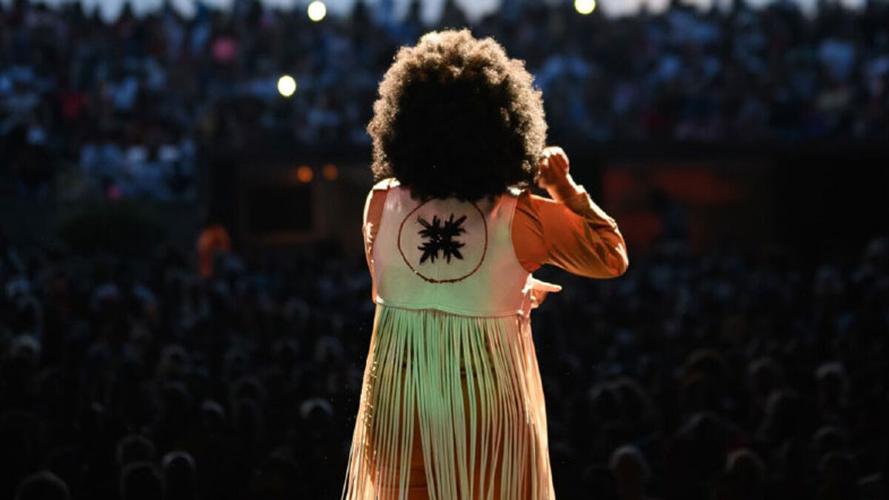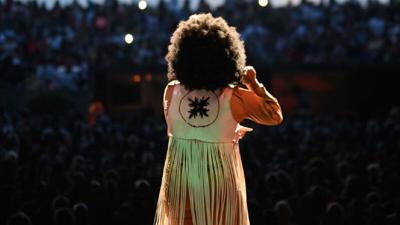
If you “heard it through the grapevine” that the Motown show is back in town, you heard right – before long, people will be dancing in the street! On March 9, vocal auditions for “Dancin’ in the Street: Motown & More Revue” were held at Off the Record, a combination cocktail bar/record shop on 416 Main St. From 10 am to 2 pm, contestants performed excerpts from two classic R&B soul classics – one up-tempo, one ballad – in hopes of landing a role in the Motown revue.
The Dancin’ in the Street: Motown & More Revue is now entering its 25th season. The three-day event will take place Memorial Day weekend (May 23-25) at Miller Outdoor Theatre. Partially funded by the City of Houston (through the Miller Theatre Advisory Board), the revue is produced by BACEment Foundation for the Arts, a local nonprofit launched by the Whitmore family. One arm of the nonprofit is Shirley Marks Whitmore and her husband Clarence Whitmore, Sr., who founded the Motown revue with a collective of local artists in 1995, which they organized through their company BACE (Black American Cultural & Educational Productions). They later passed the torch to their children: Clarence Jr., Azania, Ta and Dalilah.
Creative director and show producer Dalilah Selman says that when her parents founded the show, it was to celebrate Black art and offer local performers a chance to shine: “When they first started the show, that was the mission: to preserve Black art forms. Also, to give a platform to local Black talent that didn't have many platforms, especially a show of this size, of this magnitude. We’re still very passionate about that, providing a platform for local Black talent. So we want the Houston audience to know who’s here, because Houston is so talented.”
“We will have probably around 15 to 20 singers, probably around 10 dancers; we’ll have an orchestra of about 18 to 20. It’ll be a very large production,” she says. “It'll be a good mixture of up-tempo party numbers and then ballads, like [by] Luther Vandross.” She tells The Forward Times that the revue will consist primarily of hits from the 1960s-1970s: “Primarily it’s usually music from the ‘60s and ‘70s, with a little ‘80s and ‘90s mixed in as well. From the ‘50s? It’s usually Ray Charles,” she states. (Interestingly, her father Clarence Whitmore Sr. performed as Charles in the revue for years.) There will also be a Tina Turner tribute, she reveals.
Turner was a focal figure during auditions, with vocalists performing “Proud Mary” and “What’s Love Got to Do with It?” Also prominent were songs by the Supremes (“You Can’t Hurry Love,” “You Keep Me Hangin’ On”), the Temptations (“My Girl”) and Gladys Knight & the Pips (“Neither One of Us,” “Midnight Train to Georgia.”) While old chestnuts by Sam Cooke and Etta James were sung, so were more recent tunes by Whitney Houston and Mariah Carey. And just as the music spanned decades, so did the singers; from a 12-year-old boy’s yearning rendition of the Jackson 5’s “Who’s Lovin’ You” to a grown man growling his way through Marvin Gaye’s “Sexual Healing.”
Those who advance past Saturday’s first round will need to be available for the second round (and finals) on March 12th and 19th. “This is the first round of auditions; we typically do three rounds,” Selman explains. The first round is general tryouts; in the second round, “we'll see if they can harmonize, if they can do choreography. And then the third round is when any people that were found in general auditions that have made it through the first and second round, along with the people who have previously been in the show [...] we hear them do some songs specifically from the set list to see who all we can use and exactly what acts they will be in. So it's a three-round process.”
What are they looking for from the auditions? “Stage presence. Character. We're really big on just maintaining the integrity of R&B and soul music, and so for this show, you have to be able to perform the songs and really capture the style of the original artist and the genre. Oftentimes, people perform like they’re at live music night or something like that – when you kind of have freedom to do your own rendition. But for our show, you want to stay as true to the genre and the original artist [as you can],” she says. “It's truly supposed to be a reflection of R&B soul music, not like a modernized take on the classics.”
“We are very, very passionate about maintaining different forms of Black art, and we know that rock and roll, country, all these genres, other people have been able to come in and kind of stake claim and it becomes a debate about who really started those genres. We’re very passionate about that never being able to happen with R&B soul music. So we want to make sure that we maintain the integrity of it and that people will remember it,” she says.
What does she want people to take away from the show? Selman answers that “for us, it’s just like a place for people to come and have Black pride, Black joy, through generations. You could have a family out there that has grandkids, great grandparents…all that. So to be able to create an event where our families, your sororities and fraternities can come together and have a reunion there – we have class reunions that come out. So it's really about unity for us – creating an event that can be a unification of just different generations of Black people.”
Please visit www.motownandmoreshow.com for information on event sponsorship and advance tickets reservations.








Commented
Sorry, there are no recent results for popular commented articles.